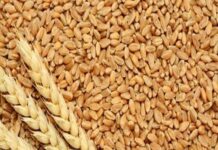Karachi [Pakistan], April 8 (ANI): As the food department continued to take action against the unauthorised movement of wheat on Friday, it became apparent that the dispute between the provincial government and the flour millers over the shunting of wheat to Karachi from interior parts of the province may increase the price of flour in the city in the coming days, reported Dawn.
Food Minister Mukesh Kumar Chawla stated that the action was taken to combat hoarding across the province, ensuring that no flour miller received the commodity more than the official quota of 6,000 bags of 100 kg per month. The action was launched as the millers feared a wheat and flour crisis in the city due to restrictions on the movement of wheat to Karachi.
He said that the provincial government had set a goal of 1.4 million metric tonnes of wheat procurement for 2023-2024 and that it was imperative to maintain a close eye on hoarders’ stocking of wheat.
The millers warned that the confiscation of wheat trucks coming from interior Sindh may lead to an increase in the price of flour, which was already being sold in the metropolis for between Rs140 and Rs160 per kg. They alleged that the wheat was being confiscated since March.
The province has restricted the transportation of wheat to prevent hoarding, according to Food Minister Chawala, who told Dawn that the procurement of wheat is in full swing.
He also said that the flour millers stowed away a sizable quantity of wheat last year, reported Dawn.
He said, “Some of the millers had stocked up to 2,00,000 bags of 100 kg and later sold wheat in the open market at higher prices,” adding that the food department had chalked out an ‘effective’ strategy to prevent any attempt of hoarding.
The minister said that in order to monitor the irregular movement of wheat, he had set up checkpoints at the provincial borders and other locations.
However, the flour millers claimed that the checkpoint authorities openly extorted a sum of Rs 75,000 to Rs 1,00,000 per vehicle to allow the transfer of wheat to Karachi.
They alleged that in order to meet its targets for wheat acquisition, the provincial government forcefully impounded truckloads of wheat and moved them to its warehouses.
The sources in the food department, as cited by Dawn, said that the action against the movement of wheat was launched on March 25. They said that earlier 200 to 300 trucks of wheat were arriving in Karachi.
The sources also said that the flour millers were given the entire last week to bring wheat to Karachi as per their quota.
Till the purchase target was not met, the transportation of wheat would be restricted, the sources quoted by Dawn added.
The flour millers said that the Sindh food secretary had promised them that the food department’s checkpoints at Kathore and Matiari would be removed, but they were still operating.
They claimed that there was a significant price disparity in wheat, with the grain being sold in Karachi for Rs11,700 per 100kg bag while it was available in the province for Rs 10,200.
The millers said that there was a wheat shortage in Karachi.
They warned that the city’s flour costs would skyrocket if the situation stayed the same and the checkpoints were not removed, and they pleaded with the provincial government to guarantee free wheat movement to Karachi.
Parts of the country have begun to harvest wheat, and the results show that the yields will not be sufficient to meet the nation’s total grain needs for 2023-2024.
The flour millers appealed to the government to permit Karachi millers to privately import 50 per cent of the designated amount of imported wheat.
According to millers, the nation’s total wheat output has decreased as a result of weather factors like floods, torrential downpours, and hailstorms. Despite the decrease in total output, the nation’s overall wheat yield and availability are insufficient to meet local demand in 2023 and 2024.
In 8MFY23, Pakistan bought 2.2 million tonnes of wheat for USD 876 million, as against the 2 million tonnes purchased for USD 752 million in the same period the previous fiscal.
Consumers are still paying Rs 2,315 to Rs 3,160 for a 20 kg flour bag as opposed to Rs 800 to Rs 1,500 exactly a year ago, despite significant imports and the availability of local crops, Dawn reported. (ANI)

















